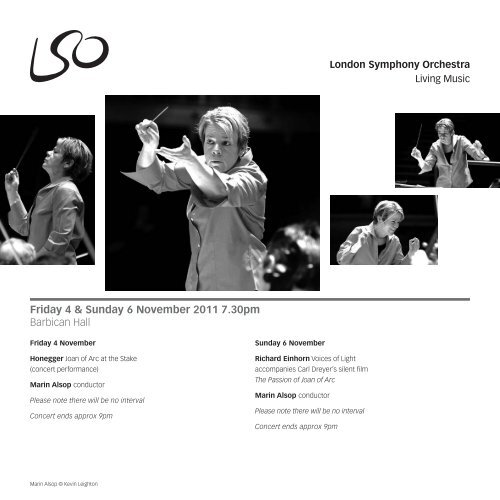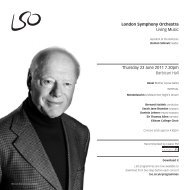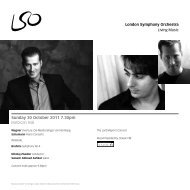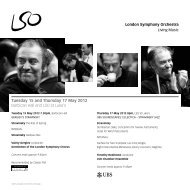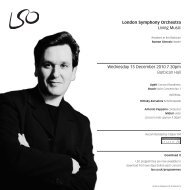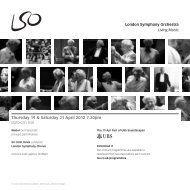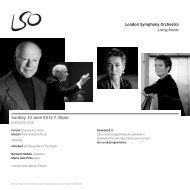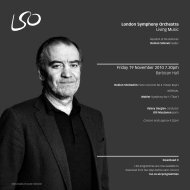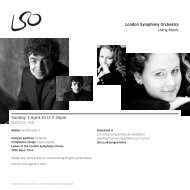6 November programme PDF - London Symphony Orchestra
6 November programme PDF - London Symphony Orchestra
6 November programme PDF - London Symphony Orchestra
You also want an ePaper? Increase the reach of your titles
YUMPU automatically turns print PDFs into web optimized ePapers that Google loves.
Friday 4 & Sunday 6 <strong>November</strong> 2011 7.30pm<br />
Barbican Hall<br />
Friday 4 <strong>November</strong><br />
Honegger Joan of Arc at the Stake<br />
(concert performance)<br />
Marin Alsop conductor<br />
Please note there will be no interval<br />
Concert ends approx 9pm<br />
Marin Alsop © Kevin Leighton<br />
Sunday 6 <strong>November</strong><br />
Richard Einhorn Voices of Light<br />
accompanies Carl Dreyer’s silent film<br />
The Passion of Joan of Arc<br />
Marin Alsop conductor<br />
Please note there will be no interval<br />
Concert ends approx 9pm<br />
<strong>London</strong> <strong>Symphony</strong> <strong>Orchestra</strong><br />
Living Music
Welcome News<br />
It is a pleasure to welcome you to this musical tribute to one of<br />
the most iconic heroines in history: Joan of Arc.<br />
2012 is the alleged 600th anniversary of Joan of Arc’s birth. In<br />
response to this, conductor Marin Alsop has created a project<br />
encompassing two evening concerts with the LSO and <strong>London</strong><br />
<strong>Symphony</strong> Chorus, and two symposia, Women and Leadership<br />
and Women in the Church.<br />
For Honegger’s oratorio Joan of Arc at the Stake, on Friday 4<br />
<strong>November</strong>, the <strong>Orchestra</strong> and Chorus are joined by a host of<br />
singers and actors, as well as the New <strong>London</strong> Children’s Choir and<br />
Cynthia Millar playing the ondes Martenot. On Sunday 6 <strong>November</strong><br />
the LSO will perform Richard Einhorn’s Voices of Light – along with<br />
soloists from Synergy Vocals – accompanying a screening of Carl<br />
Dreyer’s silent film, The Passion of Joan of Arc (1928); we extend<br />
a warm welcome to composer Richard Einhorn who will be in the<br />
audience for this concert.<br />
I hope that you will join us for our next concert here at the<br />
Barbican on Wednesday 9 <strong>November</strong>, when the <strong>Orchestra</strong>’s own<br />
Principal Flute Gareth Davies will take centre stage as soloist in<br />
Nielsen’s Flute Concerto.<br />
Kathryn McDowell<br />
LSO Managing Director<br />
Nigel Gomm – LSO Trumpet<br />
The LSO is deeply saddened by the recent death of LSO Trumpeter,<br />
Nigel Gomm, at the age of 52, after a short illness. Our thoughts are<br />
with his wife Belinda McFarlane, an LSO Violinist, his beloved children<br />
Jamie and Charli and his close family; he will be greatly missed by<br />
the whole <strong>Orchestra</strong>.<br />
A full obituary will follow in due course.<br />
Bruckner’s Fourth now available to pre-order on LSO Live<br />
Our latest LSO Live release features Bernard Haitink, internationally<br />
renowned for his interpretations of Bruckner. His performance<br />
of the Fourth <strong>Symphony</strong> with the LSO in June prompted the<br />
Evening Standard to write:<br />
‘Haitink had perfect control of its many peaks and plateaux …<br />
on a night such as this, the <strong>London</strong> <strong>Symphony</strong> <strong>Orchestra</strong> seems<br />
to be a confederacy of virtuosos.’<br />
The disc is £8.99 and orders will be posted out on 14 <strong>November</strong>.<br />
lso.co.uk/lsolive<br />
Triumphant autumn visit to New York<br />
Late last month the <strong>Orchestra</strong> visited New York’s Lincoln Center,<br />
where it holds an international residency, to perform three concerts<br />
under the batons of LSO President Sir Colin Davis and Gianandrea<br />
Noseda. Richard Morrison of The Times wrote:<br />
‘New York’s musical public is famously hard to impress.<br />
But three times in five days the audience at Avery Fisher Hall,<br />
home of the New York Philharmonic, surged to its feet to give<br />
a standing ovation to the <strong>London</strong> <strong>Symphony</strong> <strong>Orchestra</strong>.’<br />
As usual, LSO Principal Flute Gareth Davies was on hand to provide<br />
a running commentary – visit the LSO tour blog to find out more.<br />
lsoontour.wordpress.com<br />
2 Welcome & News Kathryn McDowell © Camilla Panufnik
Joan of Arc – A Voice Across Time<br />
by Marina Warner<br />
‘Joan of Arc’s multiple<br />
resurrections and<br />
transformations show<br />
how vigorous the need<br />
for figures like her remains.’<br />
In Notre Dame de Paris today, a statue of<br />
Joan of Arc stands in the southern transept,<br />
with many candles burning in front of her and<br />
a recent plaque announcing that in this very<br />
cathedral in 1452, 25 years after her death at<br />
the stake in Rouen, the assembled prelates<br />
and doctors of the Church declared null<br />
and void the earlier inquisition trial which<br />
had sentenced her.<br />
For a long time, the history of the Church’s involvement in Joan’s<br />
death was obscured: the English, helped by a few French quislings,<br />
were chiefly blamed. Joan then remained rehabilitated, a hero of the<br />
nation, but not sanctified. But in the 1890s, when anti-clerical,<br />
Socialist movements were strongly gaining ground, Joan of Arc<br />
was canonised alongside several other popular figures, including<br />
Thérèse of Lisieux, in order to recapture the faithful.<br />
An artist impression of Joan of Arc by Stephanie Ramplin<br />
The fame of Joan of Arc began in her lifetime and, though it has dipped<br />
a little now and then, she has never vanished from view. Her image acts<br />
as a magic mirror of personal and political idealism and, in particular,<br />
of changing ideas about women’s heroism. She has proved an<br />
inexhaustible source of inspiration for writers, playwrights, film-makers,<br />
performers, and composers – both for orchestral works and for opera.<br />
In a single, brief life, several of the essential mythopoeic characteristics<br />
that throughout history have defined the charismatic leader are<br />
powerfully and intensely condensed: she was young (19, she thought,<br />
when she was sent to the stake), she spoke directly with God and his<br />
angels and saints; she was courageous, convinced, lucid, and eloquent,<br />
especially in defiance; she appeared from nowhere and had no normal,<br />
legitimating officialdom behind her at a time of terrible violence and<br />
unrest (she spoke truth to power). She was a virgin: ‘Jeanne la Pucelle’<br />
(Joan the little flea, the maid), the troops called her. She was eccentric:<br />
she insisted on wearing men’s clothes though she wasn’t in disguise<br />
(everyone knew she was a girl). Above all, she was lucky, at first, and<br />
luck is a quality the Ancient Greeks knew was a divine gift. Her presence<br />
in the battle at Orléans, after months of stalemate, rallied the soldiers<br />
and the long terrible siege of the city was lifted.<br />
Joan of Arc – A Voice Across Time<br />
3
Even while she was still alive, but far more so after her death, this<br />
heroic part of her story sparked narratives of all kinds, in pictures,<br />
ballads, plays, and also satires – most notoriously by Voltaire.<br />
But more, far more followed the publication, in 1841–9, of the<br />
inquisition trial which had examined Joan for witchcraft and heresy.<br />
The transcript of the interrogations gives us the voice of this young<br />
woman across the centuries with almost unbearable immediacy;<br />
her spirit leaps from the page, uncompromising in its frankness, good<br />
sense, courage, and often breathtaking in its simple effectiveness.<br />
Some of her answers are justly famous: ‘Are you in a state of grace?‘,<br />
she was asked. ‘If I am, may I remain so. If I am not, may God put<br />
me there.’ She could be caustic: when asked, ‘Was St Michael naked<br />
when he appeared to you?’, she replied, ‘Do you think God hasn’t the<br />
wherewithal to give him clothes?’.<br />
The edition of the trial turned Joan of Arc into one of the most fully<br />
and vividly present personalities in history, about whom a great more<br />
is known, in her own words and at first hand, than is, for example,<br />
about Shakespeare. But it did not stop the flow of fictions and<br />
fantasies about her. In today’s variations, she tends to be Olympian,<br />
athletic and fierce: a supermodel, Milla Jovovich, starred in<br />
Luc Besson’s 1999 film. In the recent past, Joan was more of an<br />
enfant terrible, a kind of angelic teenage rebel, Rimbaud with a halo.<br />
She stood for civil disobedience and inextinguishable sincerity,<br />
especially under pressure from the state, and was embodied by<br />
vulnerable figures like the gamine Jean Seberg in Preminger’s 1957<br />
movie and the marvellous Sandrine Bonnaire in Jacques Rivette’s<br />
monumental two-part meditation (1994).<br />
The cultural expressions are part of an ongoing political struggle to<br />
own the symbol – you could say, the brand. She is the heroine every<br />
movement has wanted as their figurehead. In France, anti-semitic,<br />
xenophobic, extreme right parties, from the Action Française of the<br />
19th century to the Front National in the present time, have claimed<br />
that she personifies the patriotic cause of France for the French.<br />
By contrast, socialists, feminists and liberal Catholics rallied to her<br />
as the champion of the dispossessed and the wrongly accused.<br />
4 Joan of Arc – A Voice Across Time<br />
There were street fights over the title to her renown at the foot of<br />
the golden statue in the Place des Pyramides in Paris.<br />
When Theodor (Carl) Dreyer made his extraordinary film in 1928,<br />
and Arthur Honegger composed his oratorio ten years later, both<br />
were working in the light of modern wars, oppression, and prejudice.<br />
And their works are prophetic: the civil war in 15th-century France<br />
conveys the treacheries of Occupation in France and in Dreyer’s<br />
native Denmark during the Third Reich, and, in Claudel’s libretto for<br />
Honegger’s music, warns of the coming horrors.<br />
In the same year that Jeanne d’Arc au bûcher premiered in Basel,<br />
Brecht’s play, The Life of Galileo, unfolded another, later travesty<br />
of justice. Towards the end of the play, an exchange takes place:<br />
when his friend Andrea comments, ‘Pity the land that has no heroes’,<br />
Galileo ruefully ripostes, ‘No, pity the land that needs a hero’.<br />
I used to believe that Galileo’s wishful thinking could come true,<br />
but now I doubt it. We’ll never stop needing heroes and symbols,<br />
because they’re the characters in our shared stories; abandoning<br />
the search to identify them and define them, out of a kind of highminded<br />
distaste for propaganda, lets political factions manipulate<br />
them to their own ends (as the Nazis did). When Marine Le Pen calls<br />
on Joan of Arc’s name, she needs to be confronted about her bad<br />
faith, her abuse of history. Joan of Arc’s multiple resurrections and<br />
transformations show how vigorous the need for figures like her<br />
remains, and how crucial it is to meet that need with the depths of<br />
thoughtfulness that Dreyer and Honneger bring to her story.<br />
Article © Marina Warner<br />
Marina Warner is the author of Joan of Arc: The Image of Female Heroism<br />
(1981), which is being reissued by Oxford University Press in 2012.
Friday 4 <strong>November</strong><br />
Arthur Honneger (1892–1955)<br />
Jeanne d’Arc au bûcher (Joan of Arc at the Stake) (1935)<br />
Amira Casar Jeanne d’Arc<br />
David Wilson-Johnson Frère Dominique<br />
Nicolas Dorian Speaker, L’appariteur (Usher), Héraut III,<br />
Duc de Bedford, Jean de Luxembourg, Heurtebise<br />
Mark Antoine Regnault de Chartres, Guillaume de Flavy,<br />
Un paysan, Un prêtre<br />
Klara Ek La vierge<br />
Katherine Broderick Marguerite<br />
Kelley O’Connor Catherine<br />
Paul Nilon Porcus<br />
Jonathan Lemalu Bass<br />
Cynthia Millar ondes Martenot<br />
<strong>London</strong> <strong>Symphony</strong> Chorus<br />
New <strong>London</strong> Children’s Choir<br />
A dramatic oratorio in one act set in 15th-century France<br />
Performed in French with English Surtitles<br />
Libretto by Paul Claudel based on historical characters<br />
Premiered in concert in Basel, 1938<br />
Music’s better shared!<br />
There’s never been a better time to bring all your friends to an<br />
LSO concert. Groups of 10+ receive a 20% discount on all tickets,<br />
plus a host of additional benefits. Call the dedicated Group Booking<br />
Line on 020 7382 7211, visit lso.co.uk/groups, or email<br />
groups@barbican.org.uk<br />
On Sunday 6 <strong>November</strong> we welcome:<br />
The Friends of Kettle’s Yard, Cambridge<br />
Faculty of History, University of Cambridge<br />
The great hit of Diaghilev’s 1909 Paris season was his production of<br />
Cléopâtre, with the 23-year-old Ida Rubinstein in the title role. The<br />
designer Alexandre Benois wrote of her: ‘Here was not a pretty artiste<br />
appearing in frank déshabille, but a real, fatal enchantress’. Not only<br />
was Rubinstein no pretty artiste, but she had a mind of her own and,<br />
just as importantly, money of her own, from parents in the Ukraine<br />
grain trade. So her stay with Diaghilev was brief, and already by 1913<br />
she was commissioning her own production, of Pizzetti’s La Pisanella.<br />
Over the next 30 years this was followed by 22 other commissions,<br />
including Ravel’s Boléro and Stravinsky’s Perséphone.<br />
All of these were designed to display Rubinstein’s talents. But what<br />
were these talents exactly? As a dancer, she lacked technical finish,<br />
being unable to stand on point, as an actress she spoke French with<br />
a distinct Russian accent, and she couldn’t sing. The answer was that<br />
her talent lay in being a statuesque mime, in which role she was,<br />
according to many accounts, incomparable. Being bound to the stake<br />
as Joan of Arc therefore made a fitting culmination to her stage career.<br />
In the early 1930s the arts students at the Sorbonne developed<br />
a passion for 13th-century mystery plays, and when Rubinstein<br />
saw one in April 1934 she too was enthused and had the idea of<br />
commissioning a modern ‘mystery’ on the life of Joan of Arc with<br />
music by Honegger, who had already written five scores for her since<br />
1926. Initially Paul Claudel refused to write the libretto, because he<br />
had ‘never liked the idea of taking a great person as the subject for<br />
a piece, as the author feels too restricted by an overly well-known<br />
situation to give him sufficient freedom of movement’. But then,<br />
on the train from Paris to Brussels, he had a vision of clasped<br />
hands making the sign of the cross. He relented, and completed<br />
the libretto in a fortnight.<br />
Honegger was always quick to give Claudel credit for the oratorio’s<br />
success: ‘It was enough to hear Claudel read and re-read his own<br />
text. This he did with such plastic force that the whole musical pattern<br />
emerged in relief, clear and precise, for anyone possessing the<br />
slightest musical imagination’. The words ‘plastic force’ and ‘relief’<br />
are worth noting. Honegger had been the darling of the Parisian<br />
musical world in the 1920s, but in the early 30s he was increasingly<br />
Programme Notes<br />
5
Friday 4 <strong>November</strong><br />
ostracised, not least because in works like Cris du monde of 1931<br />
he had told the French truths about mechanisation and the loss<br />
of individuality that they did not want to hear. So he turned to film<br />
music, partly out of financial need, and found that the moving<br />
images inspired him. He therefore relished the sharp visual impact of<br />
Claudel’s libretto and was even willing to follow many of the poet’s<br />
precise instructions as to when music should be heard and of what<br />
sort; though he did draw the line at Claudel’s instruction, ‘the music<br />
imitates the sound of someone beating a carpet’.<br />
For Claudel’s part, he was delighted to find the idea of having Joan<br />
present throughout, bound at the stake, because he had always had<br />
reservations about the classical dance, in 1927 referring indeed to<br />
‘la sinistre Pavlova’. These reservations had possibly been caused,<br />
or at least strengthened, by various other theatrical experiences<br />
during his diplomatic career abroad: Chinese from 1895 to 1909,<br />
Dalcrozian in 1913, Nijinsky’s simple postures, based on Dalcroze,<br />
in Brazil in 1917, and finally Japanese Noh and Kabuki from 1921–27.<br />
Altogether it is unsurprising to find that his libretto for Joan of Arc<br />
is constructed symbolically and not as a straightforward narrative,<br />
Joan looking back from the point of crisis over moments in her life<br />
presented in reverse order.<br />
Honegger wrote the music between January and August 1935 and<br />
completed the orchestration on Christmas Eve, but various problems,<br />
some of Rubinstein’s own making, prevented a performance for<br />
nearly three years. The premiere was finally given as a concert<br />
performance in Basel on 12 May 1938 with Rubinstein as Joan and<br />
Jean Périer, the first Pelléas, speaking the part of Brother Dominic.<br />
Paul Sacher, who conducted, later remembered Rubinstein arriving<br />
with her maid, her hairdresser and her own champagne, but also her<br />
total professionalism. The performance was a tremendous success,<br />
restoring Honegger’s reputation and self-confidence.<br />
Programme Note © Roger Nichols<br />
6 Programme Notes<br />
Tickets £10 to £35<br />
Box Office<br />
020 7638 8891 (bkg fee)<br />
lso.co.uk (reduced bkg fee)<br />
<strong>London</strong> <strong>Symphony</strong> <strong>Orchestra</strong><br />
Living Music<br />
<strong>London</strong> <strong>Symphony</strong> <strong>Orchestra</strong><br />
Season 2011/12<br />
Sir Colin Davis conducts<br />
Weber’s Der Freischütz<br />
Thu 19 & Sat 21 Apr 7.30pm<br />
Weber Der Freischütz (concert performance)<br />
Sir Colin Davis conductor<br />
Christine Brewer Agathe<br />
Sally Matthews Ännchen<br />
Falk Struckmann Kaspar<br />
Stephan Loges Ottokar, Duke of Bohemia<br />
Martin Snell Kuno<br />
Simon O’Neill Max<br />
Marcus Farnsworth Kilian<br />
Gidon Saks Hermit<br />
<strong>London</strong> <strong>Symphony</strong> Chorus<br />
Thu 19 Apr part of UBS Soundscapes
Sunday 6 <strong>November</strong><br />
Richard Einhorn (born 1952)<br />
Voices of Light (1993)<br />
Synergy Vocals<br />
<strong>London</strong> <strong>Symphony</strong> Chorus<br />
The libretto is printed on pages 8 to 15<br />
Since 1988, when I first saw Carl Dreyer’s masterpiece, The Passion<br />
of Joan of Arc, crudely projected onto a wall in the film archive at the<br />
Museum of Modern Art in New York, I have never stopped thinking<br />
about that strange young woman who was born nearly 600 years ago<br />
into poverty, illiteracy, and abuse; who, dressed as a boy, ran away<br />
from home at age 16 to become an extraordinary military leader<br />
and won nearly every battle she fought; who, during a spectacular<br />
melée outside a city’s gates, was dragged off her battle-horse and<br />
captured to face trial by the inquisition; and who, despite displaying<br />
extraordinary piety and courage, was condemned as a heretic,<br />
excommunicated from her beloved Church, and died aged 19,<br />
burned alive at the stake.<br />
Joan’s story never ceases to amaze. She left an astonishing legacy,<br />
public and personal. She was instrumental in reversing the course<br />
of the 100 Years War. Her courage and dignity in the face of a<br />
certain, and certain to be horrible, death is an exemplar for personal<br />
courage. Her meteoric rise, from illiterate peasant girl to a position<br />
of high command within the French Army, upended the most basic<br />
assumptions of authority and class in late-Medieval French culture.<br />
Her simple, direct relationship to her God prefigured a more personal,<br />
less priest-centred religion. Even Joan’s appearance, a girl ‘crossdressed’<br />
as a male knight-in-armour, confounded conventional<br />
notions of sexual identity.<br />
Four years before I saw The Passion of Joan of Arc for the first time,<br />
I had decided to do a large piece about religion, believing it would<br />
make for a compelling musical work. I sought a religious figure,<br />
a hero, that wouldn’t easily fit a preconceived mould, someone who<br />
combined a joyful, perhaps even erotic yearning for transcendence<br />
with the courage to confront the intense physical and emotional<br />
pain that so often accompanies a deep spiritual journey.<br />
Dreyer’s cinematic portrait of Joan’s last days showed me just such a<br />
hero. Made in 1929, starring the French stage star Renée Falconetti,<br />
one of the greatest performances on film, The Passion of Joan of<br />
Arc fully acknowledged both the simplicity of Joan’s faith as well as<br />
its dark complications. Taking as its script excerpts from Joan’s trial,<br />
the film is a veritable symphony of faces – extreme close-ups shot<br />
at odd angles and in high contrast, mirroring the otherness of Joan’s<br />
experience of the world. There is even a hint of Eros: a monk (played<br />
by the impossibly handsome Antonin Artaud) achieves knowledge of<br />
God through his growing love for Joan, reacting with rage and horror<br />
as she is consumed in the pyre.<br />
After finally securing the promise of a performance, I composed<br />
Voices of Light during the autumn of 1993. Each movement parallels<br />
a film scene, with texts chosen from the writings of medieval female<br />
mystics and other ancient sources; these reflect upon the themes<br />
of each scene. I also used Joan’s own letters (dictated to a scribe),<br />
set for women’s voices and solo strings, a texture that stands<br />
apart from the rest of the piece’s sound-world. Finally, I travelled to<br />
Domremy where Joan was born, to record the church-bell from her<br />
tiny, still-standing church. It rings out several times during the piece.<br />
I tried, by layering texts and music, to complement – and sometimes<br />
to contradict – the portrayal of Joan of Arc in Dreyer’s film, to honour<br />
his film by imagining her anew. My Joan is similar to his, but tougher.<br />
She incarnates power, she is always in control, even as she walks to<br />
the stake.<br />
But my Joan is not Joan of Arc either, cannot be. That extraordinary<br />
woman remains as elusive and enigmatic, and as awe-inspiring, as ever.<br />
Programme Note © Richard Einhorn<br />
Richard Einhorn, whose most recent large work is an oratorio on<br />
Charles Darwin, lives and works in New York City.<br />
On the occasion of the <strong>London</strong> premiere of Voices of Light, the composer<br />
would like to gratefully acknowledge the considerable support<br />
provided in the early stages of this project by the British Film Institute.<br />
Programme Notes<br />
7
Sunday 6 <strong>November</strong><br />
Richard Einhorn<br />
Voices of Light: Libretto<br />
Prelude<br />
[Exclamavit autem voce magna] ‘Deus aeterne, qui absconditorum<br />
es cognitor, qui nosti omnia antequam fiant, tu scis quoniam falsum<br />
testimonium tulerunt contra me; et ecce morior, cum nihil horum<br />
fecerim quae isti malitiose composuerunt adversum me.’<br />
Thronus … flammae ignis,<br />
Rotae eius ignis accensus.<br />
Fluvius igneus rapidusque<br />
egrediebatur a facie eius;<br />
Millia millium ministrabant<br />
Et decies millies centena millia assistebant.<br />
Ludicium sedit,<br />
et libri aperti sunt.<br />
Victory at Orléans (letter from Joan of Arc)<br />
Jehanne … la Pucelle vous fait savoir des nouvelles de par decha que<br />
en VIII jours elle a cachie les Angloix hors de toutez les places quilz<br />
tenoient sur le revire de Loire par assaut et autrement ou il en eu<br />
mains mors et prins et lez a desconfis en bataille. Le frere du conte<br />
de Suffort et Glasias mors.<br />
Je vous promectz et certifie … en toultes les villes quy doibvent estre<br />
du sainct royaume … quy que vyenne contre.<br />
Car Dieu, le Roy du ciel, le veult, et cela est révélé par la Pucelle …<br />
Interrogation<br />
HOMASSE!<br />
Hee! quel honneur au femenin Sexe! …<br />
Par qui tout le regne ert desert,<br />
Par femme est sours et recouvert.<br />
8 Programme Notes<br />
[She cried out in a loud voice] ‘Everlasting God, who knows things<br />
hidden and all things before they happen, you know they have borne<br />
false witness against me; and see! I die, although I am innocent of<br />
everything their malice has invented against me.‘<br />
Daniel 13:42<br />
His throne … was ablaze with flames,<br />
His wheels were a burning fire.<br />
A swift river of fire<br />
came forth from His countenance;<br />
a thousand thousand waited upon Him<br />
Ten thousand times a hundred thousand stood by.<br />
The court sat,<br />
and the books were opened.<br />
Daniel 7:9<br />
Jehanne … the Maid sends you news from these parts: that in eight<br />
days she has chased the English out of all the places that they held<br />
along the Loire river, either by assault or otherwise, in which encounters<br />
many English were killed and captured and she has routed them in a<br />
pitched battle. A brother of the Earl of Suffolk’s and Glasdale were killed.<br />
I promise and assure you … that we will take possession of all the<br />
cities that must belong to our holy realm … in spite of all opposition.<br />
So God, King of Heaven, wills it; and so it has been revealed by the Maid …<br />
Masculine Woman!<br />
Oh! What an honour for the feminine sex! …<br />
This entire realm, once lost by [wretched men],<br />
restored and saved by a woman again.<br />
Ditié de Jehanne d’Arc by Christine de Pizan, 1429,<br />
one of the earliest known feminist writers
Virtutem … mysterium secretarum et admirandarum visionum<br />
a puellari aetate … essem usque ad praesens tempus mirabili<br />
modo in me senseram …<br />
HOMASSE!<br />
Une fillete …<br />
A qui armes ne sont pesans; …<br />
Et devant elle vont fuyant<br />
Les ennemis, ne nul n’y dure.<br />
‘Velis aut nolis haec erit tuum. Ego scio quid elegi.’<br />
Ex nemore canuto puella eliminabitur ut medelae curam adhibeat.<br />
Non induetur<br />
mulier veste virili,<br />
nec vir utetur<br />
veste feminea:<br />
abominabilis enim<br />
apud Deum<br />
est qui facit haec.<br />
The Jailers<br />
Tant y a feme scet bon taire!<br />
Tant y a feme scet bon taire!<br />
Feme a un cuer par heritage<br />
Qui ne puet estre en un estage.<br />
Or est sauvage, or est privee;<br />
Ore veult paiz, or veult meslee;<br />
Femme engine en poi d’ure<br />
Dount un[e] tere tout ploure.<br />
Que qui aime et croit fole fame<br />
Gaste son temps, pert corps et ame.<br />
From my girlhood to the present time, in a wondrous fashion<br />
I have felt in myself the power and mystery of secret and<br />
wonderful visions …<br />
St Hildegard of Bingen, mystic, poet and<br />
composer from the early 12th century<br />
Masculine Woman!<br />
A little girl …<br />
Upon whom arms and armour weigh lightly; …<br />
Before her all foes take off at a run,<br />
Of them none remains, not even a one.<br />
Ditié Christine de Pizan<br />
‘Whether or not you wish it, this will be yours. I know what I have chosen.’<br />
Na Prous Boneta, 14th-century French heretic<br />
who was burned at the stake<br />
Out of an oak forest a girl will be sent forth to bring healing.<br />
Ancient prophecy of Merlin thought to refer to Joan of Arc’s mission<br />
A woman shall not wear<br />
the clothes of a man,<br />
nor a man<br />
the clothes of a woman:<br />
for abominable<br />
in the eyes of God<br />
are those who do so.<br />
When it comes to women, men, hold your tongue!<br />
When it comes to women, men, hold your tongue!<br />
A woman’s heart is just not able<br />
To chart a course that’s firm or stable.<br />
Now she’s wild, now she’s demure;<br />
Now wants peace, then starts a war;<br />
The schemes she quickly engineers<br />
Can drown a countryside in tears.<br />
Who loves and trusts mad womankind<br />
Damns soul and body, wastes his time.<br />
Deuteronomy 22:5<br />
Programme Notes<br />
9
Ore vous ai dit de lur vies,<br />
Fuoums de lur cumpaignies.<br />
Ore vous ai dit de lur vies,<br />
Fuoums de lur cumpaignies.<br />
Tant y a feme scet bon taire!<br />
Ore vous ai dit de lur vies,<br />
Fuoums de lur cumpaignies.<br />
Pater Noster<br />
Pater Noster, qui es in Caelis,<br />
Sanctificetur nomen tuum.<br />
Adveniat regnum tuum.<br />
Fiat voluntas tua,<br />
Sicut in caelo<br />
et in terra.<br />
‘Filia mea dulcis michi; filia mea, delectum meum, templum meum;<br />
filia delectum meum, ama me: quia tu es multum amata a me, multum<br />
plus quam tu ames me.<br />
‘Et postquam ego colcavi me in te; modo colca te tu in me.<br />
‘Ista est mea creatura.’<br />
Pater Noster, qui es in Caelis<br />
Sanctificetur nomen tuum<br />
Adveniat regnum tuum<br />
Fiat voluntas tua,<br />
Sicut in caelo<br />
et in terra.<br />
Et sentiebam dulcedinem divinam ineffabilem.<br />
‘Et postquam ego colcavi me in te; modo colca te tu in me.<br />
‘Ista est mea creatura.<br />
‘Filia mea dulcis michi; filia mea, delectum meum, templum meum;<br />
filia delectum meum, ama me: quia tu es multum amata a me, multum<br />
plus quam tu ames me.<br />
10 Programme Notes<br />
Now that I’ve told you of womankind,<br />
Let’s flee and leave them far behind!<br />
Now that I’ve told you of womankind,<br />
Let’s flee and leave them far behind!<br />
When it comes to women, men, hold your tongue!<br />
Now that I’ve told you of womankind,<br />
Let’s flee and leave them far behind!<br />
The Vices of Women, late 13th century misogynist poem<br />
Our Father, who art in Heaven<br />
Hallowed be Thy Name.<br />
Thy Kingdom come.<br />
Thy will be done,<br />
in Earth as it is<br />
in Heaven.<br />
Matthew 6:9–6:10<br />
‘My daughter, sweet to me; my daughter, my beloved, my temple;<br />
my daughter, my beloved, love me, since you have been much loved<br />
by me, much more than you love me.<br />
‘And after I have laid myself in you, now lay yourself in me.<br />
‘This is my creature.’<br />
Blessed Angela of Foligno 13th Century mystic and penitent<br />
Our Father, who art in Heaven<br />
Hallowed be Thy Name<br />
Thy Kingdom Come<br />
Thy will be done,<br />
in Earth as it is<br />
in Heaven.<br />
And I felt an ineffable divine sweetness.<br />
‘And after I have laid myself in you, now lay yourself in me.<br />
‘This is my creature.<br />
Matthew 6:9–6:10<br />
‘My daughter, sweet to me; my daughter, my beloved, my temple; my<br />
daughter, my beloved, love me, since you have been much loved by<br />
me, much more than you love me.
‘Et postquam ego colcavi me in te; modo colca te tu in me.<br />
‘Ista est mea creatura.’<br />
The Jailers Return<br />
Tant y a feme scet bon taire!<br />
Tant y a feme scet bon taire!<br />
Femme est dehors religiouse,<br />
Dedanz poignaunt e venimose;<br />
A soy sera d’aucun complainte,<br />
Ir se fait moult juste et moult sainte.<br />
Femme engendre bataille e guere,<br />
Exile gent de gaste tere;<br />
Femme ard chasteus e prent citez<br />
Enfudre tours e fermetez<br />
Ore vous ai dit de lur vies,<br />
Fuoums de lur cumpaignies!<br />
Ore vous ai dit de lur vies,<br />
Fuoums de lur cumpaignies.<br />
Torture<br />
Glorioses playes …<br />
Et desiderabam videre vel saltem illud parum de carne Christi<br />
quod portaverant clavi in ligno.<br />
Glorioses playes …<br />
… ostendit cor suum perforatum quasi ad modum portulae unius<br />
parvae laternae … quod ex ipso corde exiverunt radii solares.<br />
Imo solaribus radiis clariores …<br />
Glorioses playes …<br />
… ‘non est aequum, velle solum de melle meo gustare, et non de<br />
felle: si perfecte vis mecum uniri, mente intenta recogita illusiones,<br />
opprobria, flagella, mortem, et tormenta, quae pro te sustinui.’<br />
‘And after I have laid myself in you, now lay yourself in me.<br />
‘This is my creature.’<br />
When it comes to women, men, hold your tongue!<br />
When it comes to women, men, hold your tongue!<br />
On the outside she’s religious,<br />
On the inside keen and venomous;<br />
She will not tolerate complaint,<br />
She’s lady justice and a saint.<br />
Woman fosters strife and wars,<br />
And exiles men from ruined shores;<br />
Blessed Angela of Foligno<br />
Castles she burns, cities defeats<br />
Destroys the towers and the keeps.<br />
Now that I’ve told you of womankind,<br />
Let’s flee and leave them far behind!<br />
Now that I’ve told you of womankind,<br />
Let’s flee and leave them far behind!<br />
The Vices of Women, late 13th century misogynist poem<br />
Glorious wounds …<br />
Marguerite d’Oingt, early 14th century visionary and poet<br />
And I longed to see at least that little bit of Christ’s flesh that the<br />
nails had fixed to the wood.<br />
Blessed Angela of Foligno<br />
Glorious wounds …<br />
He showed [her] his heart, perforated like the openings in a small<br />
lantern … From his very heart issued forth rays of the sun, no,<br />
brighter than the sun’s rays …<br />
Na Prous Boneta<br />
Glorious wounds …<br />
… ’It is not fair to wish to taste only of my honey, and not the gall. If you<br />
wish to be perfectly united with me, contemplate deeply the mockery,<br />
insults, whippings, death and torments that I endured for you.’<br />
Blessed Margarita, disciple of St Umiltà, 14th century<br />
Programme Notes<br />
11
Illness (Letter from Joan of Arc)<br />
Jehanne la Pucelle vous requiert de par le Roy du ciel,<br />
vous puis que ne guerroiez plus ou saint Royaume de France,<br />
et sera grant pitié de la grant bataille et du sang qui y sera<br />
respendu de ceux qui y vendront contre nous.<br />
Sacrament<br />
O feminea forma, O soror Sapientie,<br />
quam gloriosa es<br />
quoniam fortissima vita<br />
in te surrexit,<br />
quam mors nunquam suffocabit.<br />
Oh maledetti! Oh grande indignazione<br />
Fuge, fuge speluncam<br />
antiqui perditoris<br />
et veniens veni in palatium regis.<br />
… car plus est adjoustee foy au mal de tant comme le bien<br />
y est plus auttentique …<br />
Abjuration<br />
Exaudi, Deus omnipotens, preces populi … Puelle agentis secundum<br />
opera que sibi dixeras.<br />
Si quis in me non manserit,<br />
mittetur foras sicut palmes,<br />
et arescet,<br />
et colligent eum,<br />
et in ignem mittent,<br />
et ardet.<br />
‘Domine, istud quod facio, non facio nisi ut inveniam te.’<br />
‘Depone animos.’<br />
12 Programme Notes<br />
Jehanne the Maid begs you on behalf of the King of Heaven,<br />
make war no longer in the holy Kingdom of France, and a pitiful<br />
thing will be that great battle and the blood that will be shed<br />
therein by those who come there against us.<br />
O feminine form, O sister of Wisdom,<br />
how glorious you are<br />
for in you has arisen<br />
the mightiest life<br />
that death will never stifle.<br />
St Hildegard of Bingen<br />
O cursed ones! O great indignation!<br />
St Umiltà of Faenza, great 14th century Italian mystic<br />
Flee, flee the cave<br />
of the ancient destroyer<br />
and come, coming into the palace of the King.<br />
St Hildegard of Bingen<br />
… evil is rendered more believable by putting it together with<br />
good to make it more respectable …<br />
From The Quarrel of the Rose Christine de Pizan<br />
Hear, Almighty God, the prayers of your people … of the girl acting<br />
according to the works which you had spoken of to her.<br />
Prayer commissioned by King Charles VII pleading for<br />
Joan’s freedom from imprisonment, 1431<br />
Those who do not remain in me<br />
will be discarded like branches:<br />
they will wither.<br />
So they will be gathered up,<br />
thrown on the fire,<br />
and burnt.<br />
John 15:6, recited to Joan of Arc by Father Erard during<br />
her trial, at the confrontation in front of St Ouen<br />
‘Lord, that which I do, I do only to find you.’<br />
Blessed Angela of Foligno<br />
‘Renounce your purpose.’<br />
From The Passion of St Perpetua, a history of an early Christian martyr
… Une femme, simple bergiere,<br />
Plus preux qu’onc homs ne fut à Romme!<br />
Ne universos nos extermines.<br />
Benedicite, ignis et aestus, Domino;<br />
‘Depone animos.’<br />
… N’y a si forte<br />
Resistance qui à l’assault<br />
De la Pucelle ne soit morte.<br />
Hester, Judith, et Delbora,<br />
Qui furent dames de grant pris, …<br />
Mains miracles en a pourpris.<br />
Plus a fait par ceste Pucelle.<br />
‘Depone animos.’<br />
… eadem hora mittemini in fornacem ignis ardentis.<br />
Et quis est Deus qui eripiet vos de manu mea?<br />
Benedicite, ignis et aestus, Domino;<br />
‘Domine, istud quod facio, non facio nisi ut inveniam te. Inveniam te<br />
postquam id perfecero!‘<br />
Relapse<br />
Karitas<br />
habundat in omnia<br />
de imis excellentissima<br />
super sidera<br />
atque amantissima<br />
in omnia<br />
quia summo regi osculum<br />
pacis<br />
dedit.<br />
… a woman, a simple shepherdess,<br />
More valiant even than Rome’s worthiest!<br />
Destroy us not all together.<br />
Fire and heat, praise the Lord!<br />
‘Renounce your purpose.’<br />
… No force is there so strong<br />
Try as they might to resist the attack<br />
Of the Maid, it dies in vain before long.<br />
One hears of Esther, Judith and Deborah,<br />
Who were ladies of great courage and worth; …<br />
Ditié Christine de Pizan<br />
St Perpetua<br />
Daniel 3:66<br />
St Perpetua<br />
Through them God performed miracles on Earth,<br />
But he fulfilled even more through this Maid.<br />
Ditié Christine de Pizan<br />
‘Renounce your purpose.’<br />
St Perpetua<br />
… The same hour you will be thrown into a furnace of burning fire.<br />
And who is the God who will snatch you from my hand?<br />
Fire and heat, praise the Lord!<br />
Daniel 3:15 and 3:66<br />
‘Lord, that which I do, I do only to find you. May I find you after I have<br />
completed it!’<br />
Blessed Angela of Foligno<br />
Love<br />
overflows into all things,<br />
from out of the depths to<br />
above the highest stars;<br />
and so Love overflows into all best beloved,<br />
most loving things,<br />
because She has given to the<br />
highest King<br />
the Kiss of Peace.<br />
St Hildegard of Bingen<br />
Programme Notes<br />
13
Anima<br />
… anima eius amore fluens et languens.<br />
… est ceste Ame cheue d’amour en nient.<br />
… mens eius insane suspensa<br />
ex vehementi cupidine …<br />
… per solum Amorem aeternum trahitur in aeternitatem Amoris<br />
… anima eius amore fluens et languens.<br />
… est ceste Ame cheue d’amour en nient.<br />
… anima eius amore fluens et languens<br />
… per solum Amorem aeternum trahitur in aeternitatem Amoris<br />
… anima eius amore fluens et languens<br />
… per solum Amorem aeternum trahitur in aeternitatem Amoris.<br />
The Final Walk<br />
[Exclamavit autem voce magna] ‘Deus aeterne, qui absconditorum<br />
es cognitor, qui nosti omnia antequam fiant, tu scis quoniam falsum<br />
testimonium tulerunt contra me; et ecce morior, cum nihil horum<br />
fecerim quae isti malitiose composuerunt adversum me.’<br />
The Burning<br />
Dominus condit sibi unum ignem dicendo sic: ‘vides hunc ignem; qualiter<br />
totam materiam et substantiam lignorum convertit in suam naturam,<br />
eodem modo natura divinitatis convertit in se animas quas sibi vult …’<br />
Rex noster promptus est<br />
suscipere sanguinem innocentum.<br />
Sed nubes super eundem sanguinem<br />
plangunt.<br />
Unde angeli concinunt<br />
et in laudibus sonant.<br />
Gloria Patri et Filio et Spiritui sancto.<br />
Rex noster promptus est<br />
Suscipere sanguinem innocentum.<br />
14 Programme Notes<br />
… The Spirit flowing and melting with love.<br />
There are Seven Manners of Loving Beatrice of Nazareth, 13th century<br />
… This Soul has fallen from love into nothingness.<br />
Marguerite Porete, 14th century member of the<br />
Free Spirit movement who was burned at the stake<br />
… The Spirit madly<br />
possessed by violent desire …<br />
… Only through everlasting Love is it drawn into the eternity of Love.<br />
… The Spirit flowing and melting with love.<br />
Beatrice of Nazareth<br />
… This Soul has fallen from love into nothingness.<br />
Marguerite Porete<br />
… The Spirit flowing and melting with love<br />
… Only through everlasting Love is it drawn into the eternity of Love<br />
… The Spirit flowing and melting with love<br />
… Only through everlasting Love is it drawn into the eternity of Love.<br />
[She cried out in a loud voice] ‘Everlasting God, who knows things<br />
hidden and all things before they happen, you know they have borne<br />
false witness against me; and see! I die, although I am innocent of<br />
everything their malice has invented against me.’<br />
Daniel 13:42<br />
The Lord made for her a fire, saying: ‘You see this fire; as it changes<br />
all the matter and substance of wood into its own nature, even so,<br />
Divine Nature changes into itself the souls it wants for itself …’<br />
Na Prous Boneta<br />
Our king is swift<br />
to receive the blood of innocents.<br />
But over the same blood the clouds<br />
are grieving.<br />
Hence the angels sing<br />
and resound in praises.<br />
Glory to the Father, the Son and the Holy Ghost.<br />
Our King is swift<br />
to receive the blood of innocents.
Sed nubes super eundem sanguinem<br />
plangunt.<br />
Jehanne, Jehanne!<br />
The Fire of the Dove<br />
Ah! Jehanne, Jehanne!<br />
Oh!<br />
… valde beatus fuisti cum Verbum Dei te in igne columbe imbuit.<br />
(ubi tu quasi aurora illuminatus es …)<br />
… valde beatus fuisti cum Verbum Dei te in igne columbe imbuit.<br />
Epilogue (Letter from Joan of Arc)<br />
Car Dieu, le Roy du ciel, le veult, et cela est révélé<br />
par la Pucelle …<br />
LSO Season 2011/12<br />
Xian Zhang conducts<br />
Nielsen Flute Concerto<br />
But over the same blood the clouds<br />
are grieving.<br />
Joan, Joan!<br />
St Hildegard of Bingen<br />
Ah! Joan, Joan!<br />
Oh!<br />
… you were greatly blessed when the Word of God steeped<br />
you in the fire of the dove.<br />
(where you were illumined like the dawn...)<br />
… you were greatly blessed when the Word of God steeped<br />
you in the fire of the dove.<br />
St Hildegard of Bingen<br />
So God, King of Heaven, wills it; and so it has been revealed<br />
by the Maid …<br />
<strong>London</strong> <strong>Symphony</strong> <strong>Orchestra</strong><br />
Living Music<br />
Wed 9 Nov 7.30pm<br />
Bartók The Miraculous Mandarin – Suite<br />
Nielsen Flute Concerto<br />
Zemlinsky The Mermaid<br />
Xian Zhang conductor<br />
Gareth Davies flute<br />
Tickets £10 to £35<br />
Box Office<br />
020 7638 8891 (bkg fee)<br />
lso.co.uk (reduced bkg fee)<br />
Programme Notes<br />
15
Marin Alsop<br />
Conductor<br />
‘Marin and the <strong>London</strong><br />
<strong>Symphony</strong> <strong>Orchestra</strong> [were]<br />
firing on all cylinders’<br />
The Independent, May 2007<br />
Marin Alsop is an inspiring and powerful<br />
voice in the international music scene, a<br />
Music Director of vision and distinction who<br />
passionately believes that ‘music has the<br />
power to change lives’. She is recognised<br />
across the world for her innovative<br />
approach to programming, and for her<br />
deep commitment to education and to the<br />
development of audiences of all ages.<br />
Her success as Music Director of the<br />
Baltimore <strong>Symphony</strong> <strong>Orchestra</strong> was<br />
recognised when, in 2009, her tenure was<br />
extended to 2015. Alsop will take up the<br />
post of Chief Conductor of the São Paulo<br />
<strong>Symphony</strong> <strong>Orchestra</strong> at the start of the 2012<br />
season, where she will steer the <strong>Orchestra</strong><br />
in its artistic and creative programming,<br />
recording ventures and its education and<br />
outreach activities.<br />
Since 1992, Marin Alsop has been Music<br />
Director of California’s Cabrillo Festival of<br />
Contemporary Music, where she has built a<br />
devoted audience for new music.<br />
Building an orchestra is one of Alsop’s great<br />
gifts, and she retains strong links with all of<br />
her previous orchestras – the Bournemouth<br />
<strong>Symphony</strong> <strong>Orchestra</strong>, where she was<br />
Principal Conductor from 2002 to 2008 and<br />
now holds the post of Conductor Emeritus,<br />
and the Colorado <strong>Symphony</strong> <strong>Orchestra</strong>,<br />
where she was Music Director from 1993 to<br />
2005 and is now Music Director Laureate.<br />
Alsop is a regular guest conductor with the<br />
great orchestras of the world, including<br />
the New York Philharmonic, Philadelphia<br />
<strong>Orchestra</strong>, Los Angeles Philharmonic, the<br />
Royal Concertgebouw <strong>Orchestra</strong>, Tonhalle<br />
Zürich, Orchestre de Paris, Bavarian Radio<br />
<strong>Symphony</strong> and La Scala Milan. She has a<br />
close relationship with both the <strong>London</strong><br />
<strong>Symphony</strong> and the <strong>London</strong> Philharmonic and<br />
appears with both orchestras most seasons.<br />
She also returns regularly to orchestras such<br />
as the Netherlands Radio Philharmonic,<br />
Frankfurt Radio <strong>Symphony</strong>, Royal Stockholm<br />
Philharmonic, Danish Radio <strong>Symphony</strong>, Oslo<br />
Philharmonic and the Czech Philharmonic.<br />
Since taking up her position in Baltimore<br />
in September 2007, Marin Alsop has<br />
spearheaded educational initiatives that<br />
reach more than 60,000 school and preschool<br />
children. In 2008 she launched<br />
OrchKids, which provides music education,<br />
instruments and mentorship to the city’s<br />
neediest young people, and in 2010 the<br />
BSO Academy, where local non-professional<br />
musicians work for a week with members<br />
of the <strong>Orchestra</strong>.<br />
In 2008 Marin Alsop became a Fellow of the<br />
American Academy of Arts & Sciences, and<br />
in the following year was chosen as Musical<br />
America’s Conductor of the Year. She is<br />
the recipient of numerous awards and is<br />
the only conductor to receive a MacArthur<br />
Fellowship, the award given by the MacArthur<br />
Foundation for exceptional creative work.<br />
Alsop’s extensive discography, which<br />
already includes a notable set of Brahms<br />
symphonies, is further distinguished by a<br />
new Dvorˇák series, which has been highly<br />
praised: ‘As in her live performances, Alsop’s<br />
well-balanced, passionate yet controlled,<br />
masterful and authoritative interpretation<br />
was remarkable’ (Neue Musik-Zeitung).<br />
Recent recordings include Bernstein’s Mass<br />
(Editor’s Choice at the 2010 Gramophone<br />
Awards) and John Adams’ Nixon in China,<br />
which the Financial Times gave five stars,<br />
calling it an ‘incandescent performance’.<br />
Born in New York, Marin Alsop attended Yale<br />
University and received her Master’s degree<br />
from The Juilliard School. Her conducting<br />
career was launched when, in 1989, she<br />
was a prize-winner at the Leopold Stokowski<br />
International Conducting Competition and<br />
in the same year was the first woman to be<br />
awarded the Koussevitzky Conducting Prize<br />
from the Tanglewood Music Center, where<br />
she was a pupil of Leonard Bernstein.<br />
16 The Artists Marin Alsop © Grant Leighton
Friday 4 <strong>November</strong><br />
Amira Casar<br />
Jeanne d’Arc<br />
Born in England, actress Amira Casar studied<br />
drama at the Conservatoire National d’Art<br />
Dramatique in Paris.<br />
She is bilingual in English and French and<br />
has worked internationally, and with leading<br />
directors including Carlos Saura, Christine<br />
Jeffs (Sylvia), Catherine Breillat (Anatomy of<br />
Hell) the Quay Brothers (The Piano Tuner of<br />
Earthquakes), the Larrieu Brothers (Peindre<br />
ou faire l’amour, Cannes official selection<br />
2005), Tony Gatlif (Transylvania), Eleonore<br />
Faucher (Gamines) and Werner Schroeter.<br />
She was also in Prenez soin de vous by artist<br />
Sophie Calle (Venice Biennale).<br />
For her portrayal as Dora Maar, the surrealist<br />
artist and Picasso’s muse in La Femme qui<br />
Pleure au Chapeau Rouge, she won Best<br />
Actress at La Rochelle Television Film Festival.<br />
Amira’s stage work includes Wallace Shawn’s<br />
Aunt Dan and Lemon directed by Tom Cairns,<br />
(Almeida Theatre), the title role in Hedda<br />
Gabler, Olivier Py’s 2009 production of<br />
Les Enfants de Saturne (Théâtre National de<br />
L’Odéon, Paris). In 2012, she will appear in<br />
the title role in The Bitter Tears of Petra<br />
Von Kant by Fassbinder (Théâtre National<br />
de l’Athénée, Paris).<br />
In 2011 and 2012, she will appear in four<br />
films: Mikael Buch’s Let my people go, the<br />
French blockbuster series La Vérité si je mens 3,<br />
Playoff by Eran Riklis with Dany Huston,<br />
and Kleist’s Michael Kohlhaas by Arnaud<br />
Des Pallières.<br />
Friday 4 <strong>November</strong><br />
David Wilson-Johnson<br />
Frère Dominique<br />
Baritone David Wilson-Johnson is one of<br />
Britain’s most established artists, and has<br />
been a regular guest of the major opera<br />
houses, orchestras and festivals worldwide<br />
under conductors including Pierre Boulez,<br />
Frans Brüggen, Charles Dutoit, Carlo Maria<br />
Giulini, Nikolaus Harnoncourt, Oliver Knussen,<br />
Gustav Leonhardt, Charles Mackerras, Zubin<br />
Mehta, André Previn, Sir Simon Rattle and<br />
Gennady Rozhdestvensky.<br />
His many recordings include Mahler<br />
<strong>Symphony</strong> No 8 with Simon Rattle and the<br />
CBSO, Brahms’ Requiem with the LSO and<br />
André Previn, Schubert’s Winterreise with<br />
fortepianist David Owen Norris, and more<br />
recently Beethoven <strong>Symphony</strong> No 9 with<br />
Philippe Herreweghe, and Berlioz’ Romeo<br />
and Juliet and The Damnation of Faust with<br />
the Philadelphia <strong>Orchestra</strong> and Charles<br />
Dutoit. Released this month is Bernard<br />
Herrmann’s Moby Dick Cantata with Michael<br />
Schonwandt and the Danish Radio forces.<br />
Now specialising in concert and recital work,<br />
his concerts have recently included more<br />
Mahler <strong>Symphony</strong> No 8 with Simon Rattle<br />
and the Berlin Philharmonic, and Charles<br />
Dutoit and the Beijing Festival <strong>Orchestra</strong>,<br />
Brahms’ Requiem with André Previn and<br />
the NHK SO in Tokyo, and concerts with the<br />
Dutch National Childrens Choir, of which he<br />
is conductor. Next month sees a series of<br />
concerts throughout Spain and Switzerland<br />
with Robert King and The King’s Consort.<br />
Friday 4 <strong>November</strong><br />
Nicolas Dorian<br />
Speaker, L’appariteur (Usher), Héraut III,<br />
Duc de Bedford, Jean de Luxembourg,<br />
Heurtebise<br />
Born in Brussels, Nicolas Dorian started<br />
preparatory musical training and jazz piano<br />
as a young boy. At the age of nine he joined<br />
Belgian boys’ choir Les Pastoureaux where<br />
he stayed for ten years, became a soloist<br />
with them, and took part in many world tours<br />
and recordings. At eleven, he commenced<br />
classical vocal training.<br />
In 2000, he joined the European Robert<br />
Schumann Youth Choir as a tenor. He entered<br />
the classical vocal section at the IMEP<br />
(Conservatoire) in 2009 where he earned<br />
Bachelor and Master degrees in singing.<br />
During that time he took part in many<br />
musicals as soloist, including the role of<br />
Tony in Bernstein’s West Side Story.<br />
In 2010 he graduated from the Royal<br />
Academy of Music with a Postgraduate<br />
Diploma in Musical Theatre.<br />
Since 2005, Nicolas has been one of the lead<br />
singers in a cappella group Witloof Bay who<br />
represented Belgium at the Eurovision Song<br />
Contest in 2011.<br />
The Artists<br />
17
Friday 4 <strong>November</strong><br />
Mark Antoine<br />
Regnault de Chartres, Guillaume de<br />
Flavy, Un paysan, Un prêtre<br />
Actor Mark Antoine was born and raised<br />
in France where, at the age of nine, he first<br />
decided to become a magician. After many<br />
successful years spent in legerdemain he<br />
discovered another card up his sleeve –<br />
theatre – and Bulgarian acting teacher Radka<br />
Riaskova became his mentor in Paris before<br />
he went on to study at RADA.<br />
In 2009 Mark founded his Franco-British<br />
theatre company EPROUVE!, exploring<br />
text-based theatre in both languages and<br />
countries, and performed The Diary of a<br />
Madman directed by Andrew Visnevski in<br />
Paris and then, in English, at the Drill Hall<br />
<strong>London</strong>. He was invited to bring the one-man<br />
play to Mayfield (East Sussex) for its Music<br />
Festival and was hailed by Festival Director<br />
Neil Mackie CBE as ’a virtuoso in a tour de<br />
force performance’.<br />
In France Mark is the star TV host of<br />
Artzooka!, a half-hour series blending live<br />
action and animation on France Télévision.<br />
18 The Artists<br />
Friday 4 <strong>November</strong><br />
Klara Ek<br />
La vierge<br />
Soprano Klara Ek’s recent notable debuts<br />
include Washington’s National <strong>Symphony</strong><br />
<strong>Orchestra</strong> (Haydn’s The Creation) with<br />
Helmuth Rilling, the LSO (Mahler’s <strong>Symphony</strong><br />
No 4) with Bernard Haitink, the Berlin<br />
Philharmonic (Bach’s Magnificat) with Ton<br />
Koopman and the Gewandhausorchester<br />
Leipzig (Schumann’s Szenen aus Goethes<br />
Faust) with Christopher Hogwood.<br />
This season she makes her debuts with<br />
the Chicago <strong>Symphony</strong> <strong>Orchestra</strong> (Mahler’s<br />
<strong>Symphony</strong> No 4 and The Creation) and<br />
Tonhalle-Orchester Zürich (Mahler <strong>Symphony</strong><br />
No 4), both with Bernard Haitink, and with<br />
the National Taiwan <strong>Symphony</strong> <strong>Orchestra</strong><br />
(Fidelio) under Lan Shui. She makes her debut<br />
with the Hallé (Beethoven <strong>Symphony</strong> No 9)<br />
with Nikolaj Znaider.<br />
On stage, Klara Ek’s roles have included<br />
Susanna (The Marriage of Figaro) for the<br />
Royal Danish Opera, Pamina (The Magic Flute)<br />
for Staatstheater Stuttgart, Ilia (Idomeneo)<br />
for Danish National Opera, and Echo (Ariadne<br />
auf Naxos) at Grand Théâtre de Genève<br />
under Jeffrey Tate. Most recently she has<br />
appeared as Romilda (Xerxes) with Den<br />
Ny Opera and Clélie (Aeneas i Cartago)<br />
for Konzerthaus Berlin.<br />
Friday 4 <strong>November</strong><br />
Katherine Broderick<br />
Marguerite<br />
Soprano Katherine Broderick studied in<br />
<strong>London</strong> at the Guildhall School of Music<br />
and Drama and the National Opera Studio.<br />
She also spent a year at the Mendelssohn<br />
Hochschule in Leipzig.<br />
Current and future plans include Ortlinde<br />
in Die Walküre for The Royal Opera, Covent<br />
Garden; Helmwige in Die Walküre for Opera<br />
North, where she will also sing Woglinde in<br />
Götterdämmerung; Dvorˇák’s Stabat Mater<br />
with the BBC Philharmonic, and recitals at<br />
the Wigmore Hall with Malcolm Martineau<br />
and Eugene Asti.<br />
Recent appearances have included Donna<br />
Anna in Don Giovanni with English National<br />
Opera; First Lady in The Magic Flute for<br />
Glyndebourne on Tour; Miezysław in<br />
Weinberg’s The Portrait for Opera North,<br />
and Helmwige in Die Walküre for Oper<br />
Leipzig, a role she has also sung with the<br />
Hallé and Sir Mark Elder.<br />
Concerts include appearances with the<br />
BBC <strong>Symphony</strong>, BBC Philharmonic,<br />
Bournemouth <strong>Symphony</strong>, Singapore <strong>Symphony</strong><br />
and Royal Liverpool Philharmonic orchestras,<br />
the Mozarteum <strong>Orchestra</strong> and National<br />
<strong>Orchestra</strong> of Spain, working with conductors<br />
Donald Runnicles, Gianandrea Noseda,<br />
Jirˇí Bělohlávek, Marin Alsop, Simone Young,<br />
Ivor Bolton and Paul McCreesh.
Friday 4 <strong>November</strong><br />
Kelley O’Connor<br />
Catherine<br />
Grammy award-winning mezzo-soprano<br />
Kelley O’Connor has quickly emerged as one<br />
of the most compelling performers of her<br />
generation.<br />
Recent highlights include her BBC Proms and<br />
Edinburgh International Festival debuts in<br />
2010, Berio’s Folk Songs with the LSO at the<br />
Berlin Festival, Britten’s ‘Spring’ <strong>Symphony</strong><br />
with the Atlanta <strong>Symphony</strong> <strong>Orchestra</strong> and<br />
Janáček’s The Cunning Little Vixen with the<br />
New York Philharmonic.<br />
Conductors with whom Kelley O’Connor<br />
has worked include Bernard Haitink, Alan<br />
Gilbert, Lorin Maazel, Christoph Eschenbach,<br />
Stéphane Denève, Daniel Harding and Iván<br />
Fischer. She has performed operatic roles<br />
for the Canadian Opera Company, Cincinnati<br />
Opera and Santa Fe Opera, among others,<br />
and is particularly associated with the role of<br />
Federico García Lorca in Golijov’s Ainadamar,<br />
which was written for her. Her discography<br />
includes numerous recordings for Deutsche<br />
Grammophon and Telarc.<br />
Engagements in 2011/12 include the world<br />
premiere of a new oratorio The Gospel<br />
According to the Other Mary by John Adams<br />
with the Los Angeles Philharmonic, concerts<br />
with the Cleveland <strong>Orchestra</strong>, San Francisco<br />
<strong>Symphony</strong>, Atlanta <strong>Symphony</strong> and St Louis<br />
<strong>Symphony</strong>, and Ainadamar for the Teatro<br />
Real, Madrid.<br />
Friday 4 <strong>November</strong><br />
Paul Nilon<br />
Porcus<br />
Paul Nilon is established as one of Europe’s<br />
outstanding lyric tenors. He has an active<br />
concert career with highlights including<br />
Mozart Requiem, Schumann’s Das Paradies<br />
und die Peri and Handel Susanna, all with<br />
the <strong>Orchestra</strong> of the Age of Enlightenment;<br />
Tippett A Child of Our Time with the Northern<br />
Sinfonia, Beethoven’s Missa Solemnis with<br />
the BBC National <strong>Orchestra</strong> of Wales, Britten’s<br />
War Requiem and Serenade for Tenor, Horn<br />
and Strings with the Hallé and the Messiah<br />
with The Sixteen and Harry Christophers.<br />
Recent and future operatic engagements<br />
include the title role in a new production<br />
of Idomeneo for English National Opera<br />
and for the Buxton Festival in a version by<br />
Richard Strauss, Chartkov in Weinberg’s<br />
The Portrait and Albert Gregor in Makropoulos<br />
Case for Opera North, Sultan in Vivaldi’s La<br />
verità in cimento for Garsington Opera and<br />
Dove’s Life is a Dream with Birmingham<br />
Opera Company. Concert engagements<br />
include Mahler Das Lied von der Erde for<br />
the North Norfolk Festival and Bournemouth<br />
<strong>Symphony</strong> <strong>Orchestra</strong>, Blackford’s Not in<br />
Our Time with the Bournemouth <strong>Symphony</strong><br />
Chorus, Dvorˇák’s Stabat Mater with the<br />
BBC Philharmonic <strong>Orchestra</strong>, a recital at<br />
the Buxton Festival and a concert in Venice<br />
with Nelly Miricioiu.<br />
Friday 4 <strong>November</strong><br />
Jonathan Lemalu<br />
Bass<br />
Born in New Zealand, bass-baritone Jonathan<br />
Lemalu’s roles include Papageno, Figaro,<br />
Leporello, Masetto, Rocco, Bottom, Colline,<br />
Porgy, Basilio, Neptune, Saul, Zaroastro,<br />
Rodomonte, Queequeg (Moby Dick) and<br />
Duke Bluebeard. Opera houses he has<br />
appeared at include Covent Garden, English<br />
National Opera, Opéra de Lyon, Opera<br />
Australia, Cincinnati Opera, The Dallas Opera,<br />
Chicago Lyric, The Metropolitan Opera, the<br />
Staatsoper of Munich and Hamburg, and the<br />
Glyndebourne, Salzburg, Styriarte, Edinburgh<br />
and Gergiev festivals.<br />
His concert and recital performances span<br />
both classical and contemporary repertoire<br />
and include the Berlin, New York, Rotterdam<br />
and Los Angeles Philharmonic orchestras,<br />
and the New Zealand, <strong>London</strong>, Boston,<br />
Chicago, San Francisco, Toronto, Paris and<br />
Tokyo <strong>Symphony</strong> orchestras with conductors<br />
that include Davis, Dutoit, Gergiev, Harding,<br />
Harnoncourt, Mackerras, Mehta, Norrington,<br />
Pappano, Rattle and Summers.<br />
His future operatic engagements include<br />
revivals of Heggie’s Moby Dick for San<br />
Diego Opera and San Francisco Opera,<br />
The Marriage of Figaro for Baden Baden<br />
and Mozart’s Requiem with the Beethoven<br />
Orchester Bonn.<br />
The Artists<br />
19
Friday 4 <strong>November</strong><br />
Cynthia Millar<br />
Ondes Martenot<br />
Cynthia Millar studied the ondes Martenot<br />
first with John Morton in England and later<br />
with Jeanne Loriod.<br />
Since she first performed in the Turangalîla<br />
<strong>Symphony</strong> at the BBC Proms with Sir Mark<br />
Elder and the National Youth <strong>Orchestra</strong>,<br />
she has appeared with many of the world’s<br />
leading orchestras; in <strong>November</strong> 2009 she<br />
gave her 100th performance of the work, with<br />
the Monte-Carlo Philharmonic <strong>Orchestra</strong>.<br />
Conductors with whom she has worked<br />
include Sir Simon Rattle, Sir Andrew Davis,<br />
André Previn, Esa-Pekka Salonen, Edo de<br />
Waart, Leonard Slatkin, Yan Pascal Tortelier,<br />
Kent Nagano, Franz Welser Möst, Mark<br />
Wigglesworth, Matthias Bamert, Donald<br />
Runnicles, Ilan Volkov, Mariss Jansons,<br />
Yakov Kreizberg and Gustavo Dudamel.<br />
She has performed Honegger’s Joan of Arc<br />
at the Stake with Antonio Pappano and the<br />
Academia Nazionale di Santa Cecilia in Rome,<br />
with David Robertson and the BBC <strong>Symphony</strong><br />
<strong>Orchestra</strong>, with Libor Pešek and the Royal<br />
Liverpool Philharmonic <strong>Orchestra</strong> at the<br />
BBC Proms, with David Zinman at the Aspen<br />
Festival, and with Marin Alsop at the Oregon<br />
Bach Festival. Plans include Turangalîla<br />
with the Orquestra Sinfónica de Castilla<br />
y León, the Luxembourg Philharmonic,<br />
Symphonieorchester des Bayerischen<br />
Rundfunks and the Seattle <strong>Symphony</strong>.<br />
20 The Artists<br />
Friday 4 <strong>November</strong><br />
New <strong>London</strong><br />
Children’s Choir<br />
Jason Panagiotopoulos soloist<br />
The New <strong>London</strong> Children’s Choir offers a<br />
unique opportunity for girls and boys aged<br />
between 7 and 18 to learn to sing and enjoy<br />
all kinds of music. Launched by Ronald Corp<br />
in 1991, the Choir has appeared in all the<br />
major <strong>London</strong> concert halls with the UK’s<br />
finest symphony orchestras and conductors,<br />
has collaborated with opera companies in<br />
the UK and abroad, and has made dozens of<br />
recordings and broadcasts. Recent discs have<br />
included Pigs could fly (a collection of British<br />
music), Jonah Man Jazz and other cantatas<br />
by Michael Hurd and the children’s opera<br />
The Ice Mountain by Ronald Corp.<br />
The Choir has a special commitment to<br />
commissioning and has premiered over 40<br />
new works by composers including Diana<br />
Burrell, Simon Bainbridge, Howard Skempton,<br />
Philip Cashian, Patrick Nunn, Richard Causton,<br />
Gary Carpenter and Morgan Hayes. It has also<br />
taken part in premieres including works by<br />
Sally Beamish, Sir Peter Maxwell Davies, Louis<br />
Andriessen (all BBC Proms), George Benjamin<br />
and Gerald Barry as well as taking part in<br />
concerts with Nico Muhly, Paul McCartney,<br />
Lou Reed, Hayley Westenra and These New<br />
Puritans. The choir has travelled to festivals<br />
around the world including New York and<br />
the Azores.<br />
BBC Radio 3 Lunchtime Concerts<br />
Thursdays at 1pm, LSO St Luke’s<br />
Beethoven Piano Sonatas<br />
A complete retrospective<br />
Thu 10 & 17 Nov 1pm<br />
Elisabeth Leonskaja<br />
Sonatas Op 13 (‘Pathétique’),<br />
Op 14 No 1, Op 110, Op 49 No 2,<br />
Op 109, Op 111<br />
Thu 24 Nov 1pm<br />
Barry Douglas<br />
Sonatas Op 79,<br />
Op 106 (‘Hammerklavier’)<br />
‘Weighty, wonderfully intense playing.’<br />
The Guardian on Barry Douglas<br />
Tickets £10<br />
lso.co.uk/lunchtimeconcerts<br />
020 7638 8891
Sunday 6 <strong>November</strong><br />
Synergy Vocals<br />
Micaela Haslam director<br />
‘Unfailingly impressive performances’<br />
The Guardian<br />
Solo Quartet<br />
Olivia Robinson soprano, Heather Cairncross alto<br />
Andrew Busher tenor, Tom Bullard baritone<br />
Voice of Joan<br />
Micaela Haslam, Joanna Forbes L’Estrange<br />
Synergy Vocals is a unique organisation, providing bespoke teams of<br />
singers for all kinds of projects involving amplified voices. The team<br />
has worked closely with Steve Reich for many years, and collaborates<br />
regularly with Ensemble Modern, Ictus, Asko|Schönberg, <strong>London</strong><br />
Sinfonietta and the Colin Currie Group.<br />
Synergy has performed all over the world with many other outstanding<br />
orchestras and ensembles, including the BBC <strong>Symphony</strong> <strong>Orchestra</strong>,<br />
the Boston, Chicago and St Louis <strong>Symphony</strong> <strong>Orchestra</strong>s, Ensemble<br />
InterContemporain, the BBC Philharmonic, the Los Angeles, Brooklyn<br />
and New York Philharmonic <strong>Orchestra</strong>s, Nexus, Percussion Claviers<br />
de Lyon, Tempo Reale Ensemble; and in collaboration with the Royal<br />
Ballet, Mark Baldwin, Rosas and Opéra de Paris dance companies.<br />
The group’s world premieres include Steve Reich’s Three Tales and<br />
Daniel Variations, Steven Mackey’s Dreamhouse, Louis Andriessen’s<br />
video opera La Commedia and David Lang’s Writing on Water, as well<br />
as the UK premiere of Nono’s monumental Prometeo on <strong>London</strong>’s<br />
South Bank. Synergy Vocals is also a highly-acclaimed exponent of the<br />
works of Luciano Berio, especially his 1968 masterpiece Sinfonia.<br />
Synergy Vocals has undertaken educational and outreach projects for<br />
The Royal Conservatoire in The Hague, Princeton University, Eastman<br />
College, Oberlin College and the Chicago <strong>Symphony</strong> <strong>Orchestra</strong>,<br />
both coaching vocal ensembles and working with composers in the<br />
creation of new works involving singers. Micaela Haslam also coaches<br />
instrumental ensembles for Steve Reich in the preparation of his<br />
Music for Eighteen Musicians.<br />
The group’s recordings include Steven Mackey’s Dreamhouse<br />
(2011 Grammy winner) with BMOP/Gil Rose, Louis Andriessen’s<br />
De Staat with <strong>London</strong> Sinfonietta/David Atherton, Steve Reich’s<br />
Music for Eighteen Musicians with Ensemble Modern, Tehillim<br />
with LA Philharmonic/Stefan Asbury, Three Tales with Steve Reich<br />
& Musicians/Bradley Lubman, and Karl Jenkins’ Imagined Oceans.<br />
Synergy is featured on television advertisements and film soundtracks<br />
including Jane Eyre, Narnia: The Voyage of the Dawn Treader, Harry<br />
Potter and the Goblet of Fire, Nanny McPhee, V for Vendetta, Triangle<br />
and The Secret of Moonacre, and has provided backing vocals for<br />
several pop and rock artists including Steven Wilson, Hikaru Utada,<br />
Example, Funeral for a Friend and Henry Priestman.<br />
LSO Watch, Listen & Learn<br />
Are you part of a choir?<br />
<strong>London</strong> <strong>Symphony</strong> <strong>Orchestra</strong><br />
Living Music<br />
Would you like to receive information about attending exclusive<br />
<strong>London</strong> <strong>Symphony</strong> Chorus open rehearsals directed by leading<br />
conductors such as Marin Alsop and Sir Colin Davis?<br />
Email choral@lso.co.uk<br />
or call Fabienne Morris on 020 7382 2522<br />
to find out more about this exciting opportunity for singers<br />
The Artists 21
Friday 4 <strong>November</strong><br />
On stage<br />
First Violins<br />
Carmine Lauri Leader<br />
Tomo Keller<br />
Nigel Broadbent<br />
Ginette Decuyper<br />
Jörg Hammann<br />
Maxine Kwok-Adams<br />
Elizabeth Pigram<br />
Colin Renwick<br />
Ian Rhodes<br />
Sylvain Vasseur<br />
Rhys Watkins<br />
Daniel Bhattacharya<br />
Hilary Jane Parker<br />
Alina Petrenko<br />
Erzsebet Racz<br />
Julia Rumley<br />
Second Violins<br />
David Alberman<br />
Thomas Norris<br />
Richard Blayden<br />
Matthew Gardner<br />
Iwona Muszynska<br />
Philip Nolte<br />
Paul Robson<br />
Louise Shackelton<br />
Ingrid Button<br />
Eleanor Fagg<br />
Raja Halder<br />
Hazel Mulligan<br />
Stephen Rowlinson<br />
Helena Smart<br />
Violas<br />
Paul Silverthorne<br />
Gillianne Haddow<br />
Malcolm Johnston<br />
Regina Beukes<br />
German Clavijo<br />
Anna Green<br />
Richard Holttum<br />
Robert Turner<br />
Jonathan Welch<br />
Caroline O’Neill<br />
Fiona Opie<br />
Anna Dorothea Vogel<br />
22 The <strong>Orchestra</strong><br />
Cellos<br />
Timothy Hugh<br />
Eve-Marie Caravassilis<br />
Alastair Blayden<br />
Jennifer Brown<br />
Mary Bergin<br />
Noel Bradshaw<br />
Daniel Gardner<br />
Hilary Jones<br />
Minat Lyons<br />
Susan Dorey<br />
Double Basses<br />
Vitan Ivanov<br />
Colin Paris<br />
Nicholas Worters<br />
Patrick Laurence<br />
Matthew Gibson<br />
Jani Pensola<br />
Simo Vaisanen<br />
Beverley Jones<br />
Flutes<br />
Adam Walker<br />
Siobhan Grealy<br />
Piccolo<br />
Sharon Williams<br />
Oboes<br />
Fabien Thouand<br />
Lauren Weavers<br />
Clarinets<br />
Chris Richards<br />
Chi-Yu Mo<br />
Bass Clarinet<br />
Lorenzo Iosco<br />
E-flat Clarinet<br />
Chi-Yu Mo<br />
Saxophones<br />
Simon Haram<br />
Timothy Holmes<br />
Shaun Thompson<br />
Bassoons<br />
Rachel Gough<br />
Christopher Gunia<br />
Lawrence O’Donnell<br />
Contra-Bassoon<br />
Dominic Morgan<br />
Trumpets<br />
Philip Cobb<br />
Gerald Ruddock<br />
Robin Totterdell<br />
Paul Mayes<br />
Trombones<br />
Dudley Bright<br />
James Maynard<br />
Matthew Knight<br />
Bass Trombone<br />
Paul Milner<br />
Timpani<br />
Nigel Thomas<br />
Percussion<br />
Neil Percy<br />
David Jackson<br />
Jeremy Cornes<br />
Antoine Bedewi<br />
Benedict Hoffnung<br />
Keyboards<br />
John Alley<br />
Caroline Jaya-Ratnam<br />
Celeste<br />
Catherine Edwards<br />
Sunday 6 <strong>November</strong><br />
On stage<br />
First Violins<br />
Carmine Lauri Leader<br />
Tomo Keller<br />
Nigel Broadbent<br />
Ginette Decuyper<br />
Jörg Hammann<br />
Maxine Kwok-Adams<br />
Harriet Rayfield<br />
Colin Renwick<br />
Ian Rhodes<br />
David Worswick<br />
Erzsebet Racz<br />
Hazel Mulligan<br />
Alina Petrenko<br />
Helena Smart<br />
Second Violins<br />
David Alberman<br />
Thomas Norris<br />
Sarah Quinn<br />
Miya Vaisanen<br />
Richard Blayden<br />
Matthew Gardner<br />
Iwona Muszynska<br />
Philip Nolte<br />
Andrew Pollock<br />
Paul Robson<br />
Louise Shackelton<br />
Eleanor Fagg<br />
Violas<br />
Paul Silverthorne<br />
Gillianne Haddow<br />
Regina Beukes<br />
German Clavijo<br />
Richard Holttum<br />
Robert Turner<br />
Jonathan Welch<br />
Natasha Wright<br />
Caroline O’Neill<br />
Fiona Opie<br />
Cellos<br />
Timothy Hugh<br />
Alastair Blayden<br />
Jennifer Brown<br />
Noel Bradshaw<br />
Daniel Gardner<br />
Hilary Jones<br />
Minat Lyons<br />
Sue Sutherley<br />
Double Basses<br />
Vitan Ivanov<br />
Colin Paris<br />
Nicholas Worters<br />
Patrick Laurence<br />
Matthew Gibson<br />
Thomas Goodman<br />
Jani Pensola<br />
Flutes<br />
Adam Walker<br />
Siobhan Grealy<br />
Oboes<br />
Fabien Thouand<br />
Lauren Weavers<br />
Keyboard<br />
John Alley<br />
Lists correct at time of<br />
going to press<br />
See page xv for <strong>London</strong><br />
<strong>Symphony</strong> <strong>Orchestra</strong><br />
members<br />
Editor<br />
Edward Appleyard<br />
edward.appleyard@lso.co.uk<br />
Photography<br />
Mark Harrison<br />
Kevin Leighton<br />
Bill Robinson<br />
Alberto Venzago<br />
Nigel Wilkinson<br />
Print<br />
Cantate 020 7622 3401<br />
Advertising<br />
Cabbell Ltd 020 8971 8450
<strong>London</strong> <strong>Symphony</strong> Chorus<br />
President<br />
Sir Colin Davis CH<br />
President Emeritus<br />
André Previn KBE<br />
Vice Presidents<br />
Claudio Abbado<br />
Michael Tilson Thomas<br />
Patron<br />
Simon Russell Beale<br />
Guest Chorus<br />
Director<br />
Natalie Murray Beale<br />
Chairman<br />
James Warbis<br />
Accompanist<br />
Roger Sayer<br />
The <strong>London</strong> <strong>Symphony</strong> Chorus was formed in 1966, and while maintaining<br />
special links with the <strong>London</strong> <strong>Symphony</strong> <strong>Orchestra</strong>, has also partnered<br />
the principal UK orchestras and internationally has worked with the Berlin<br />
and Vienna Philharmonic orchestras, Boston <strong>Symphony</strong> <strong>Orchestra</strong> and the<br />
European Union Youth <strong>Orchestra</strong>, among others.<br />
Along with regular appearances at the major <strong>London</strong> venues, the LSC<br />
tours extensively throughout Europe and has visited North America, Israel,<br />
Australia and the Far East. This season’s highlights include visits to Bonn,<br />
Paris and New York with the LSO under Sir Colin Davis and Gianandrea<br />
Noseda, and concerts with the BBC Philharmonic, BBC Scottish <strong>Symphony</strong><br />
<strong>Orchestra</strong> and the <strong>London</strong> <strong>Symphony</strong> <strong>Orchestra</strong>.<br />
The Chorus has recorded widely, with recent releases including Haydn’s<br />
The Seasons, Walton’s Belshazzar’s Feast and Verdi’s Otello, and the world<br />
premiere issue of MacMillan’s St John Passion. The Chorus also partners<br />
the LSO on Gergiev’s recordings of Mahler’s Symphonies Nos 2, 3 and 8,<br />
while the men of the Chorus took part in the recent Gramophone awardwinning<br />
recording of Götterdämmerung with the Hallé under Sir Mark Elder.<br />
In 2007, the <strong>London</strong> <strong>Symphony</strong> Chorus established its Choral Conducting<br />
Scholarships, which enable aspiring young conductors to gain valuable<br />
experience with a large symphonic chorus. The Chorus has also<br />
commissioned new works from composers such as Sir John Tavener, Sir<br />
Peter Maxwell Davies, Michael Berkeley and Jonathan Dove, and took part<br />
in the world premiere of James MacMillan’s St John Passion with the LSO<br />
and Sir Colin Davis in 2008, and in the second <strong>London</strong> performance in<br />
February 2010.<br />
The <strong>London</strong> <strong>Symphony</strong> Chorus is always interested in recruiting new<br />
members, welcoming applications from singers of all backgrounds, subject<br />
to an audition. Open Rehearsals are also being held for those who might<br />
be interested in auditioning. For further information, call Helen Lawford,<br />
Auditions Secretary, on 020 8504 0295 or visit lsc.org.uk.<br />
Sopranos<br />
Angel Belsey, Ann Cole, Vicky Collis, Emma Craven,<br />
Sara Daintree, Anna Daventry, Lorna Flowers, Eileen Fox,<br />
Joanna Gueritz, Maureen Hall, Jessica Harris#,<br />
Carolin Harvey, Emily Hoffnung*, Gladys Hosken,<br />
Debbie Jones*, Helen Lawford*#, Debbie Lee,<br />
Marta Lozano Molano, Irene McGregor, Eva Moreda,<br />
Jeannie Morrison, Jenny Norman, Emily Norton,<br />
Andra Patterson+, Ann Pfeiffer, Chen Shwartz,<br />
Amanda Thomas*+<br />
Altos<br />
Laura Bodo, Liz Boyden, Gina Broderick*+, Jo Buchan*,<br />
Liz Cole, Zoë Davis, Lydia Frankenburg*, Christina Gibbs+,<br />
Yoko Harada, Jo Houston, Elisabeth Iles, Vanessa Knapp#,<br />
Gilly Lawson, Selena Lemalu, Belinda Liao,<br />
Barbara Marchbank, Liz McCaw+, Jane Muir, Siu-Wai Ng+,<br />
Helen Palmer, Maud Saint-Sardos+, Nesta Scott, Lis Smith,<br />
Jane Steele, Claire Trocmé, Agnes Vigh, Kate Vlietstra,<br />
Mimi Zadeh<br />
Tenors<br />
Paul Allatt, Robin Anderson, Ingram Cheung,<br />
John Farrington, Matt Fernando+, Warwick Hood,<br />
Malcolm Nightingale, Stuart Packford, Peter Sedgwick,<br />
Takeshi Stokoe, Anthony Stutchbury, Malcolm Taylor,<br />
Owen Toller, James Warbis*, Robert Ward*<br />
Basses<br />
David Armour, Bruce Boyd, Andy Chan, James Chute,<br />
Damian Day, Thomas Fea, Robert French, Rober Garbolinski*,<br />
John Graham, Robin Hall, Owen Hanmer*, Alex Kidney*,<br />
Geoff Newman, William Nicholson, Edwin Smith*,<br />
Martin Vallas, Paul Wright<br />
* denotes member of Council<br />
# 4 Nov only<br />
+ 6 Nov only<br />
Friday 4 <strong>November</strong> soloists<br />
Vicky Collis La mère aux Tonneaux<br />
Bruce Boyd L’ane<br />
Malcolm Taylor Pecus I<br />
Owen Toller Voix de Perrot<br />
<strong>London</strong> <strong>Symphony</strong> Chorus<br />
23
<strong>London</strong> <strong>Symphony</strong> <strong>Orchestra</strong><br />
Season 2011/12<br />
‘Nielsen’s music could have<br />
been written for the LSO’<br />
The Financial Times, on Sir Colin Davis’<br />
Nielsen series<br />
Resident at the Barbican<br />
lso.co.uk<br />
020 7638 8891<br />
<strong>London</strong> <strong>Symphony</strong> <strong>Orchestra</strong><br />
Living Music<br />
Sir Colin Davis’ Nielsen & Beethoven Finale<br />
Sun 4 & Tue 6 Dec 2011<br />
Haydn <strong>Symphony</strong> No 98<br />
Beethoven Piano Concerto No 4<br />
with Mitsuko Uchida<br />
Nielsen <strong>Symphony</strong> No 2<br />
(‘The Four Temperaments’)<br />
6 Dec Sponsored by Canon Europe<br />
Sun 11 & Tue 13 Dec 2011<br />
Haydn <strong>Symphony</strong> No 93<br />
Nielsen <strong>Symphony</strong> No 3<br />
(‘Sinfonia espansiva’)<br />
Beethoven<br />
Piano Concerto No 5 (‘Emperor’)<br />
with Mitsuko Uchida


